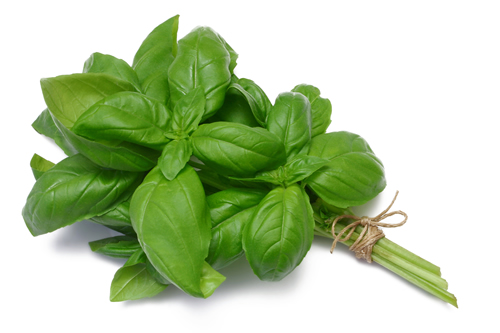Basil is an aromatic herb that is known for its health-benefiting phytonutrients. Basil has anti-imflammatory properties which is beneficial in reducing the risks of diseases in which imflammation is a key factor such as cancer, heart disease, asthma, allergies, and arthiritis.
Nutrients per Serving
One serving of basil, is 2 Tbsp chopped.
Click here to read the nutrient information per serving of basil.
Nutrients and Associated Health Benefits
– Vitamin A: protects the body against oral and lung cancers and helps delay the aging process
– Vitamin C: reduces the risk of heart disease, cancer, arthritis, and helps strengthen the immune system
– Vitamin K: helps strengthen the bones which decreases the risk of osteoporosis, and prevents calcium buildup in the tissues thereby reducing the risk of stroke and cardiovascular disease
– Calcium: reduces the risk of osteoporosis and may reduce risk of colorectal, ovarian, and breast cancers
– Potassium: helps maintain healthy heart rate and healthy blood pressure
– Magnesium: decreases the risk of heart disease, type 2 diabetes, and osteoporosis in postmenopausal women
– Copper: protects the body from free-radicals which decreases the risk of developing certain types of cancers
– Iron: combats sysmptoms of anemia and is essential for normal growth and development
Click here to learn more about iron, symptoms of iron deficiency, and iron-rich foods.
– Zea-xanthin: a flavonoid which offers protection against eye disorders such as age-related macular disease
– Beta-carotene: a flavonoid compound which protects the body from free-radicals thereby decreasing the chances of cancers such as oral and lung cancer
In addition to all these nutrients, basil contains several compounds of essential oils that are known for their anti-imflammatory, anti-bacterial, and anti-viral properties.
How to Choose Basil
There are many varieites of basil such as Thai Basil and Lemon Basil, each with a unique flavour. Basil is easy to grow indoors in a pot on a sunny windowledge as well as outside in the garden in full sun. If you choose to buy basil from the store, look for bunches that have no discoloured or wilted leaves.
How to Store Basil
If you purchase basil, it is best to store them in the crisper of your refridgerator. Keep the basil away from ethylene-producing fruits. Cut basil can also be kept in a glass jar with a little bit of water just like cut flowers, but out of direct sunlight. Using this method will ensure the basil stays fresh for up to one week or more. Just be sure to change the water every few days.
Incorporating Basil into Your Diet
– Basil works with with tomato flavours
– Great addition to pasta, pizzas, and bruschetta
– Add to soups and salads
– Make a strawberry-basil smoothie
– Make basil pesto sauce
– Add to fried rice or couscous
DID YOU KNOW?…
– There are over two dozen varities of basil, each with its own unique flavour.
– It is best to choose fresh basil over dry basil because fresh basil contains significantly higher amounts of essential oils, Vitamin C, and carotene levels.
– The flavour of basil increases with cooking. Add the basil near the end of cooking to perserve the other flavours in your dish.
Feature Image: gardenculture.net




